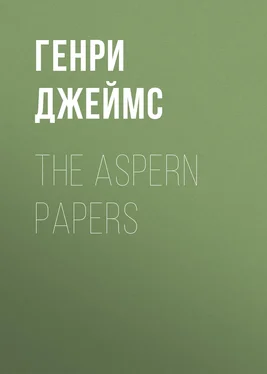Генри Джеймс - The Aspern Papers
Здесь есть возможность читать онлайн «Генри Джеймс - The Aspern Papers» — ознакомительный отрывок электронной книги совершенно бесплатно, а после прочтения отрывка купить полную версию. В некоторых случаях можно слушать аудио, скачать через торрент в формате fb2 и присутствует краткое содержание. Жанр: Социально-психологическая фантастика, foreign_antique, foreign_prose, на английском языке. Описание произведения, (предисловие) а так же отзывы посетителей доступны на портале библиотеки ЛибКат.
- Название:The Aspern Papers
- Автор:
- Жанр:
- Год:неизвестен
- ISBN:нет данных
- Рейтинг книги:5 / 5. Голосов: 1
-
Избранное:Добавить в избранное
- Отзывы:
-
Ваша оценка:
- 100
- 1
- 2
- 3
- 4
- 5
The Aspern Papers: краткое содержание, описание и аннотация
Предлагаем к чтению аннотацию, описание, краткое содержание или предисловие (зависит от того, что написал сам автор книги «The Aspern Papers»). Если вы не нашли необходимую информацию о книге — напишите в комментариях, мы постараемся отыскать её.
The Aspern Papers — читать онлайн ознакомительный отрывок
Ниже представлен текст книги, разбитый по страницам. Система сохранения места последней прочитанной страницы, позволяет с удобством читать онлайн бесплатно книгу «The Aspern Papers», без необходимости каждый раз заново искать на чём Вы остановились. Поставьте закладку, и сможете в любой момент перейти на страницу, на которой закончили чтение.
Интервал:
Закладка:
“Yes, if he had been your lover and someone wanted them!” And I added that John Cumnor was so convinced, and so all the more convinced by Miss Bordereau’s tone, that he would have come himself to Venice on the business were it not that for him there was the obstacle that it would be difficult to disprove his identity with the person who had written to them, which the old ladies would be sure to suspect in spite of dissimulation and a change of name. If they were to ask him point-blank if he were not their correspondent it would be too awkward for him to lie; whereas I was fortunately not tied in that way. I was a fresh hand and could say no without lying.
“But you will have to change your name,” said Mrs. Prest. “Juliana lives out of the world as much as it is possible to live, but none the less she has probably heard of Mr. Aspern’s editors; she perhaps possesses what you have published.”
“I have thought of that,” I returned; and I drew out of my pocketbook a visiting card, neatly engraved with a name that was not my own.
“You are very extravagant; you might have written it,” said my companion.
“This looks more genuine.”
“Certainly, you are prepared to go far! But it will be awkward about your letters; they won’t come to you in that mask.”
“My banker will take them in, and I will go every day to fetch them. It will give me a little walk.”
“Shall you only depend upon that?” asked Mrs. Prest. “Aren’t you coming to see me?”
“Oh, you will have left Venice, for the hot months, long before there are any results. I am prepared to roast all summer—as well as hereafter, perhaps you’ll say! Meanwhile, John Cumnor will bombard me with letters addressed, in my feigned name, to the care of the padrona.”
“She will recognize his hand,” my companion suggested.
“On the envelope he can disguise it.”
“Well, you’re a precious pair! Doesn’t it occur to you that even if you are able to say you are not Mr. Cumnor in person they may still suspect you of being his emissary?”
“Certainly, and I see only one way to parry that.”
“And what may that be?”
I hesitated a moment. “To make love to the niece.”
“Ah,” cried Mrs. Prest, “wait till you see her!”
II
“I must work the garden—I must work the garden,” I said to myself, five minutes later, as I waited, upstairs, in the long, dusky sala, where the bare scagliola floor gleamed vaguely in a chink of the closed shutters. The place was impressive but it looked cold and cautious. Mrs. Prest had floated away, giving me a rendezvous at the end of half an hour by some neighboring water steps; and I had been let into the house, after pulling the rusty bell wire, by a little red-headed, white-faced maidservant, who was very young and not ugly and wore clicking pattens and a shawl in the fashion of a hood. She had not contented herself with opening the door from above by the usual arrangement of a creaking pulley, though she had looked down at me first from an upper window, dropping the inevitable challenge which in Italy precedes the hospitable act. As a general thing I was irritated by this survival of medieval manners, though as I liked the old I suppose I ought to have liked it; but I was so determined to be genial that I took my false card out of my pocket and held it up to her, smiling as if it were a magic token. It had the effect of one indeed, for it brought her, as I say, all the way down. I begged her to hand it to her mistress, having first written on it in Italian the words, “Could you very kindly see a gentleman, an American, for a moment?” The little maid was not hostile, and I reflected that even that was perhaps something gained. She colored, she smiled and looked both frightened and pleased. I could see that my arrival was a great affair, that visits were rare in that house, and that she was a person who would have liked a sociable place. When she pushed forward the heavy door behind me I felt that I had a foot in the citadel. She pattered across the damp, stony lower hall and I followed her up the high staircase—stonier still, as it seemed—without an invitation. I think she had meant I should wait for her below, but such was not my idea, and I took up my station in the sala. She flitted, at the far end of it, into impenetrable regions, and I looked at the place with my heart beating as I had known it to do in the dentist’s parlor. It was gloomy and stately, but it owed its character almost entirely to its noble shape and to the fine architectural doors—as high as the doors of houses—which, leading into the various rooms, repeated themselves on either side at intervals. They were surmounted with old faded painted escutcheons, and here and there, in the spaces between them, brown pictures, which I perceived to be bad, in battered frames, were suspended. With the exception of several straw-bottomed chairs with their backs to the wall, the grand obscure vista contained nothing else to minister to effect. It was evidently never used save as a passage, and little even as that. I may add that by the time the door opened again through which the maidservant had escaped, my eyes had grown used to the want of light.
I had not meant by my private ejaculation that I must myself cultivate the soil of the tangled enclosure which lay beneath the windows, but the lady who came toward me from the distance over the hard, shining floor might have supposed as much from the way in which, as I went rapidly to meet her, I exclaimed, taking care to speak Italian: “The garden, the garden—do me the pleasure to tell me if it’s yours!”
She stopped short, looking at me with wonder; and then, “Nothing here is mine,” she answered in English, coldly and sadly.
“Oh, you are English; how delightful!” I remarked, ingenuously. “But surely the garden belongs to the house?”
“Yes, but the house doesn’t belong to me.” She was a long, lean, pale person, habited apparently in a dull-colored dressing gown, and she spoke with a kind of mild literalness. She did not ask me to sit down, any more than years before (if she were the niece) she had asked Mrs. Prest, and we stood face to face in the empty pompous hall.
“Well then, would you kindly tell me to whom I must address myself? I’m afraid you’ll think me odiously intrusive, but you know I MUST have a garden—upon my honor I must!”
Her face was not young, but it was simple; it was not fresh, but it was mild. She had large eyes which were not bright, and a great deal of hair which was not “dressed,” and long fine hands which were—possibly—not clean. She clasped these members almost convulsively as, with a confused, alarmed look, she broke out, “Oh, don’t take it away from us; we like it ourselves!”
“You have the use of it then?”
“Oh, yes. If it wasn’t for that!” And she gave a shy, melancholy smile.
“Isn’t it a luxury, precisely? That’s why, intending to be in Venice some weeks, possibly all summer, and having some literary work, some reading and writing to do, so that I must be quiet, and yet if possible a great deal in the open air—that’s why I have felt that a garden is really indispensable. I appeal to your own experience,” I went on, smiling. “Now can’t I look at yours?”
“I don’t know, I don’t understand,” the poor woman murmured, planted there and letting her embarrassed eyes wander all over my strangeness.
“I mean only from one of those windows—such grand ones as you have here—if you will let me open the shutters.” And I walked toward the back of the house. When I had advanced halfway I stopped and waited, as if I took it for granted she would accompany me. I had been of necessity very abrupt, but I strove at the same time to give her the impression of extreme courtesy. “I have been looking at furnished rooms all over the place, and it seems impossible to find any with a garden attached. Naturally in a place like Venice gardens are rare. It’s absurd if you like, for a man, but I can’t live without flowers.”
Читать дальшеИнтервал:
Закладка:
Похожие книги на «The Aspern Papers»
Представляем Вашему вниманию похожие книги на «The Aspern Papers» списком для выбора. Мы отобрали схожую по названию и смыслу литературу в надежде предоставить читателям больше вариантов отыскать новые, интересные, ещё непрочитанные произведения.
Обсуждение, отзывы о книге «The Aspern Papers» и просто собственные мнения читателей. Оставьте ваши комментарии, напишите, что Вы думаете о произведении, его смысле или главных героях. Укажите что конкретно понравилось, а что нет, и почему Вы так считаете.












